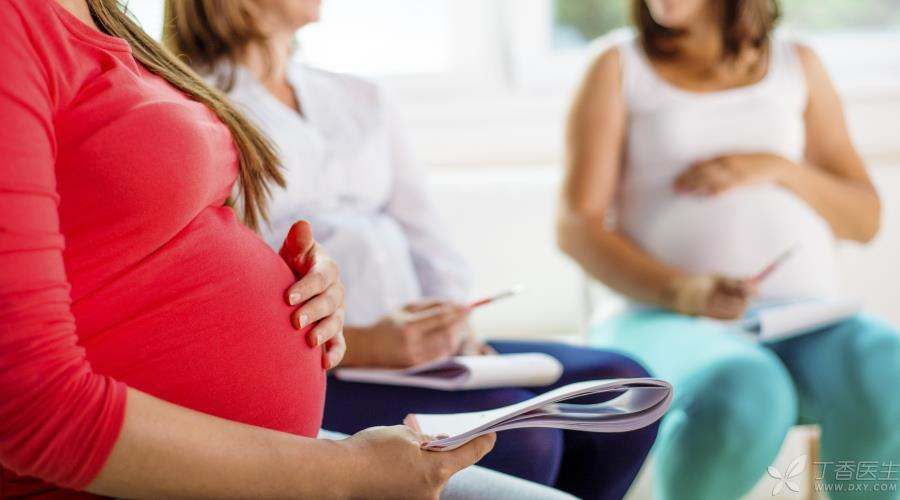
Having children, having children and raising children are almost everyone’s compulsory courses in life. Faced with increasing pressure to survive, many women will face the problem of how to balance work and having children.
Born early, I don’t want to, all aspects of the conditions are not ripe; I was born late, worried that my body would not allow me.
So, how old is it best to have children?
In fact, the medical content involved in this issue is not as much as you think. Today, Dr. Tian Tai will talk to you about this issue from various angles.
Starting from Medicine: Good Age = Minimizing Adverse Risk
From a medical point of view alone, the so-called “good age” means that the incidence of various adverse outcomes in medicine is the lowest.
We can tell you the conclusion first: from the perspective of complications, pregnancy between 25 and 34 years old has lower risk; If the fetal abnormalities are combined, pregnancy between 25 and 29 years old is more ideal.
1. Maternity-related complications and age
There has been a study of more than 7 million hospitalized population in the United States in 2009, listing the relationship between maternal-related complications and age.
The complications include premature delivery, intrauterine infection, puerperal infection, low birth weight, postpartum hemorrhage, fetal asphyxia, hypertension, mild preeclampsia, severe preeclampsia, eclampsia and placenta previa.
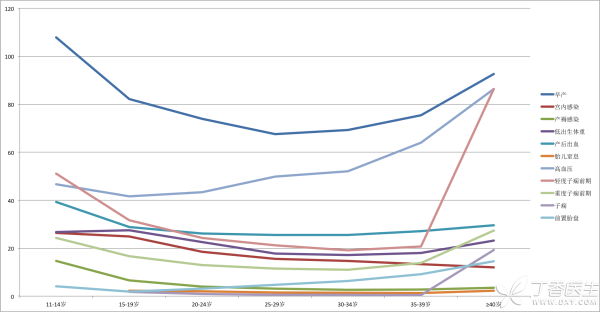
It can be seen that the final result is generally a [U]-shaped curve, with both ends high and the middle low.
In other words, both older and younger people have higher risks, while the age of a certain middle section has the lowest probability of occurrence of risks.
Of course, different diseases will be different. For example, hypertension, the older you get, the higher the incidence rate. However, premature delivery has a higher incidence rate at a younger age.
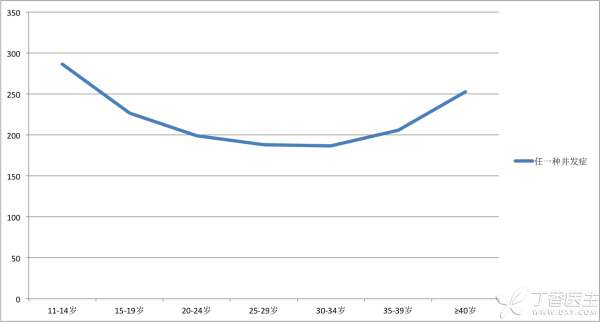
This figure means the incidence of any of the above complications in each age group. We generally call it [incidence of complications during pregnancy].
This data is more intuitive.
From this, we can see that if we do not say a specific complication, we can generally look at the risk of complications during pregnancy. The risk is highest between 11 and 14 years old, followed by ≥ 40 years old, and lowest between 30 and 34 years old.
2. Incidence and age of fetal malformation
As it is difficult to count large samples of various abnormalities, only chromosomal abnormalities are listed here, such as Down’s syndrome, which is often referred to.
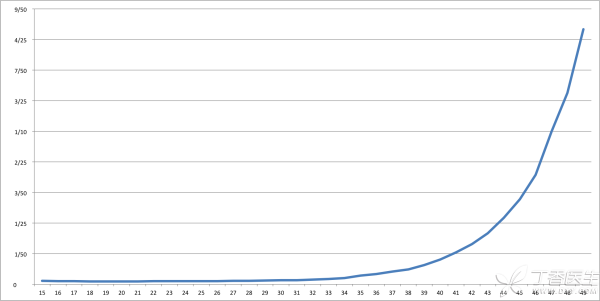
This is the relationship between the incidence of chromosomal abnormalities and age.
It can be seen that:
The lowest age of chromosome abnormality incidence is 19 ~ 21 years old, and then it increases year by year, but the degree of increase is not very large. After 35 years old, the range starts to increase. When 40 years old, the incidence of fetal chromosome abnormality is 1/62, 1/10 at 47 years old and 1/6 at 49 years old.
In other words, if you are pregnant at the age of 49, one in six people has chromosomal abnormalities-if you can still conceive.
Speaking of which, in fact, on the issue of [the best age to have children], the relevant medical contents have been basically finished.
However, the issue of pregnancy and childbirth is really not only related to medicine.
[Best] Not so good, medicine only gives a probability
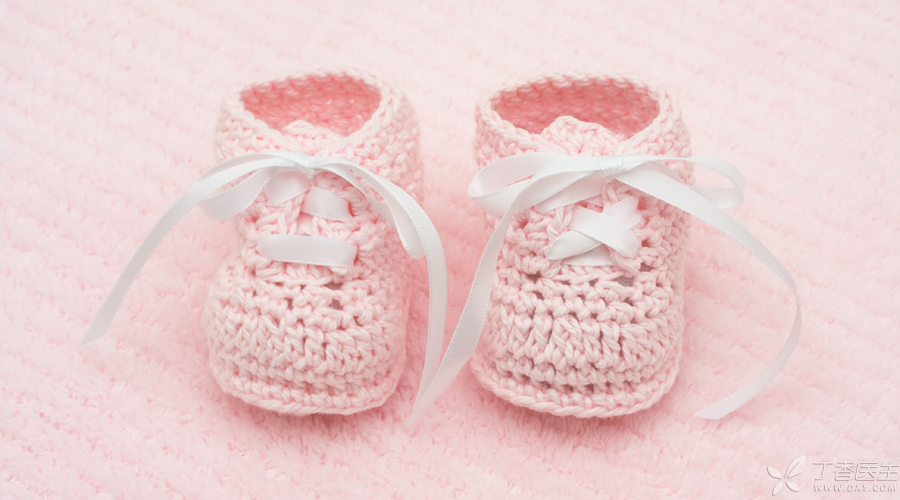
Looking at the above figures, you can also feel that medicine can only give a risk probability, and the risk of those complications is based on [1/1000].
Even in the age group with the highest incidence of complications, the probability of any kind of complications does not exceed 30%. Even the age group with the lowest risk has a risk of complications of more than 18%.
In this way, the so-called “best” is not so outstanding, and compared with “non-best”, the advantage may not be as obvious as you think.
Therefore, the key to the medical probability problem lies in how to understand and interpret it.
When we are discussing the [best childbearing age], we must remember that this best is only the [best] in probability.
It never means that if you don’t have children at this age, it means that you have to be inferior, or that children will have what problems. It doesn’t mean that if you have children at this age, you will definitely be able to benefit smoothly.
Probability is used to make decisions.
At work, I often tell patients that probability has little meaning to individuals. Only when making decisions can its real value be reflected.
For example, for the problem of having children at the age of 17, 27 or 37, it is less likely to have problems at the age of 27 in terms of probability.
However, this is only a purely medical point of view.
What is involved in having children is far from health. Your family background, life experience, learning process and career planning will have a great impact.
For example, if you give birth at a certain age, your entire career may be seriously affected. In terms of probability, the severity of this impact on your life is probably much greater than the incidence rate of that percentage.
Accept uncertainty and dilute fear of the unknown.
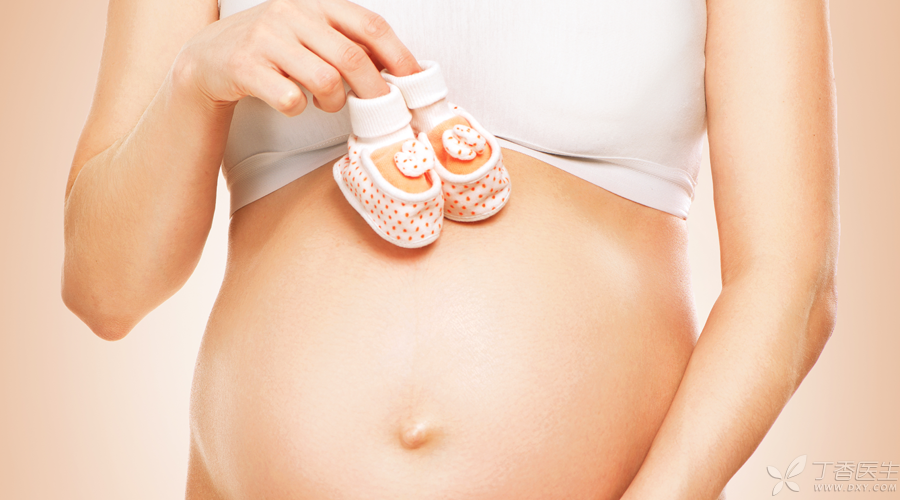
We often say that doctors need to consider a person as a complete person, not just physical health.
Everyone has many sides and angles. Medicine or health is just one of them. To say the least, even medicine is not so dogmatic. Medical recommendations are only said from the perspective of reducing risks, not absolutely good or bad.
For example, it is always best to prepare for pregnancy, which can really reduce the incidence of adverse outcomes during pregnancy to the greatest extent. However, if you are pregnant before you are ready for pregnancy, do you have to abort the child?
In fact, most of the time, we hope that medicine will give a [best] statement, mainly hoping to use an authoritative statement to ease our fear of the unknown.
Yes, when we lose control of something important, our hearts will be filled with anxiety, but unfortunately, there are not so many certain things in the world, and one cannot fully control the future.
What you need to do is not to understand [how old is the best to have children], but to understand and accept the uncertainty. After all, there are too many factors that affect whether you are [living a happy life] in the end, and it is far from being solved by a few [best].
